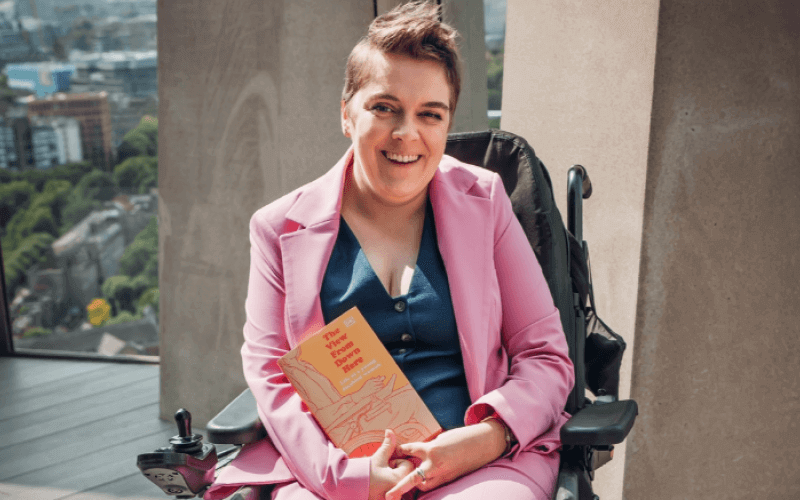The response to comments made by a journalist and author have exposed the disablist and dehumanising abuse disabled women often receive when they speak out publicly on controversial issues.
A social media post featuring a brief comment by Lucy Webster (pictured) at a public event on the need for other feminists to accept that “disability is a women’s rights issue” – and posted the day before International Women’s Day – led to a torrent of online abuse from men.
Much of the worst abuse targeted Webster as a disabled woman, while some of it was also homophobic.
Although she eventually closed comments on the post to stop the flow of abuse, she briefly re-opened them again to allow Disability News Service (DNS) to examine the hostility she had been exposed to.
DNS found more than 20 comments that could be described as hostile and disablist, with countless others aggressively challenging her views on disability rights and feminism.
One comment said she “needs to be put in a home”, another who responded referred to her as “it”, and another described her as a “broken dishwasher”, while several described her as a “r*tard”.
Webster, whose critically-acclaimed memoir The View From Down Here was published in 2023, said afterwards that she had “never experienced hate like it”.
She said: “A large chunk of the hate comments, especially the ones involving slurs and dehumanising language, explicitly or implicitly reference my speech impediment.
“I never get these comments on my written posts where people can’t hear me. We really need to talk about the link.”
But she also pointed out that, other than her own friends, it only appeared to have been disabled women like fellow journalists Frances Ryan, Rachel Charlton-Dailey and Lydia Wilkins, who had tried to defend her.
Webster said: “Sadly, this only serves to prove my point. Where’s the solidarity?”
In her response to the Instagram post, Ryan said she had also noticed “horrendous ableism – and borderline fascist – language on X about the upcoming disability cuts.
“The change in algorithms has clearly shone a light on the gutter and it is deeply disturbing to see.”
Fellow disabled, queer campaigner and writer Ellen Jones, who was appearing with Webster at the event, said afterwards in another post: “Lucy’s other post (a text post) had 40k views and no hate comments – proving yet again that disabled women are attacked for simply existing in public.
“It’s clear [if] Lucy had written those exact same words instead of speaking them, the abuse would have been different. She was punished for using her own voice.
“This is not just ableism. It is ableism and sexism working together.
“Women are already dehumanised for speaking up, and disabled people are constantly told we should be silent.”
Picture by Ania Flaszczynska
A note from the editor:
Please consider making a voluntary financial contribution to support the work of DNS and allow it to continue producing independent, carefully-researched news stories that focus on the lives and rights of disabled people and their user-led organisations.
Please do not contribute if you cannot afford to do so, and please note that DNS is not a charity. It is run and owned by disabled journalist John Pring and has been from its launch in April 2009.
Thank you for anything you can do to support the work of DNS…

 Disabled musicians face discrimination, harassment, racism, and debt, says new report
Disabled musicians face discrimination, harassment, racism, and debt, says new report ‘Major concern’ as disability hate crime prosecutions fall again, although recorded offences also drop
‘Major concern’ as disability hate crime prosecutions fall again, although recorded offences also drop England’s Euros run saw rise in ‘deeply offensive’ online comments
England’s Euros run saw rise in ‘deeply offensive’ online comments